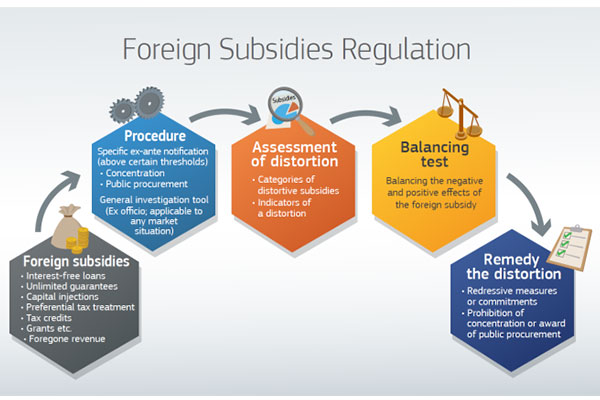I. Law enforcement trends
Since the Regulation on Government Subsidies from Non-EU Member States That May Distort the EU Market (hereinafter referred to as the Regulation) came into effect in July 2023, it has become an important tool for regulating market fairness. The Regulation mainly targets economic activities carried out by non-EU enterprises within the EU after receiving subsidies from their own governments, ensuring that these activities will not distort the competitive environment due to the intervention of non-market forces.

(1) Obligation to report
According to the Regulation, non-EU companies with certain economic thresholds must report to the European Commission details of government subsidies received in the past three years when conducting investment, mergers and acquisitions or participating in bidding activities in the EU. Since the obligation came into effect in December 2023, the number of notifications received by the European Commission has exceeded expectations, demonstrating the strictness of supervision and the high level of compliance of companies.
(2) Case review
The European Commission has reviewed many cases in accordance with the Regulation. For example, after reviewing some Chinese companies' bidding projects in the EU, the European Commission found price distortions caused by subsidies, and some companies withdrew from the bidding. In addition, the European Commission has also taken measures such as surprise inspections against companies suspected of receiving government subsidies that affect fair market competition, further demonstrating the strictness and depth of law enforcement.
II. Prediction of future law enforcement trends
According to the recently released "National Report on China's Economic Distortions", it is expected that the EU will have stricter supervision over Chinese companies in the future, especially in key industries such as telecommunications, semiconductors, rail transportation, new energy and electric vehicles. The following aspects may be the focus of supervision:
(1) Details of financial support
For any form of financial support received by enterprises, such as direct grants, preferential financing, tax breaks, etc., the European Commission will conduct an in-depth investigation into its specific relevance to economic activities, especially how these subsidies may affect tender quotations and market competition conditions.
(2) Pricing and cost structure
Tender pricing strategies and cost structures will be the focus of the review to determine whether there are price distortions caused by government subsidies.
(3) Long-term and unlimited subsidies
Particular attention is paid to long-term or uncapped subsidy measures, which are generally seen as having a high risk of having significant market distortion effects.
3. Suggestions for enterprises to respond
Faced with an increasingly stringent regulatory environment, especially the challenges brought by the Regulation, companies should adopt the following strategies to remain competitive and avoid potential legal risks:
(1) Enhance transparency
Companies should regularly assess and disclose the details of all government subsidies they receive and ensure that this information has been fully notified to the European Commission before any economic activities involving the EU market.
(2) Preliminary risk assessment
Before engaging in any economic activities that may fall under the Regulations, enterprises should conduct a thorough internal review to assess the compliance risks that may arise from these activities, especially with regard to the sources of funds and the financial arrangements of the projects.
(3) Establishing an emergency response mechanism
In response to possible surprise inspections or requests for additional information, companies should establish a rapid response mechanism to ensure that all supplementary information or documents required by the European Commission can be provided in a short period of time.
In short, with the full implementation of the Regulation and further dynamics of EU regulators, non-EU companies, especially Chinese companies, need to constantly adjust their strategies to cope with the increasingly stringent market access and regulatory review in the EU. By strengthening internal control and compliance management, companies can better adapt to this change, protect their own interests and maintain fair competition.


 Follow customer service WeChat
Follow customer service WeChat